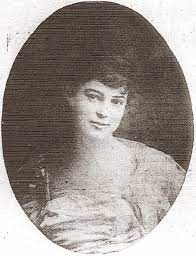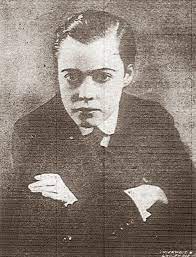On April 28, 1899, Lucille Pugh of Lewiston in Eastern North Carolina wrote Charles Duncan McIver to petition for admittance to the State Normal and Industrial School. Pugh was the daughter of a cotton farmer, and, like many students who wrote McIver, her family was not able to cover the cost of tuition, room, and board. She wrote, “I am very anxious to attend the Normal College this fall, but am not able to defray my expenses.” She asks if there are any jobs available at the school that she can perform, adding that she is “willing to do anything to get an education.” After learning more about her education up that point, McIver offered her a position in the “laundry department.” While Pugh admitted that she had “never ironed any,” she was willing and able to do the work, as it meant she could further her education.
 Sixteen-year-old Pugh arrived at State Normal in October 1899 to begin her studies. But her financial woes continued. In November 1899, she borrowed money from McIver to travel home, but was unable to repay it upon her return. Prior to each successive semester, she writes McIver to petition for a campus job, fearing that a lack of funds would prohibit her from returning to State Normal. In the Summer of 1901, she went so far as to move to Atlantic City, NJ, to take a job as a cashier in hopes of raising enough money to cover her college expenses for the following year. That job, combined with a gift from an undisclosed source, gave her enough money to return to State Normal in the fall. But by January, she had no more money and her father, who was ill with “yellow chills” (likely malaria), was unable to harvest a crop and could not pay her school bills. She was forced to leave the school in early 1902.
Sixteen-year-old Pugh arrived at State Normal in October 1899 to begin her studies. But her financial woes continued. In November 1899, she borrowed money from McIver to travel home, but was unable to repay it upon her return. Prior to each successive semester, she writes McIver to petition for a campus job, fearing that a lack of funds would prohibit her from returning to State Normal. In the Summer of 1901, she went so far as to move to Atlantic City, NJ, to take a job as a cashier in hopes of raising enough money to cover her college expenses for the following year. That job, combined with a gift from an undisclosed source, gave her enough money to return to State Normal in the fall. But by January, she had no more money and her father, who was ill with “yellow chills” (likely malaria), was unable to harvest a crop and could not pay her school bills. She was forced to leave the school in early 1902.
Sadly, Pugh’s story was not an uncommon one. Many State Normal students were forced to withdraw before completing the program due to the financial strain on their families. What Pugh did after leaving State Normal, however, sets her in a class by herself. She traveled to New York to visit an aunt, and, after working for a while as a stenographer, she enrolled in night classes at the New York University Law School. In 1908, she graduated and was admitted to the New York Bar Association at the age of 24.
Only four years later, Pugh became the first female lawyer in the country to defend an accused murderer when she was assigned the case of LeRoy Poindexter, an African American man accused of killing a white man over a game of craps. In her defense of Poindexter, Pugh argued that his 14th Amendment rights had been violated because neither the grand jury that indicted him nor the special jury impaneled to try him had any African American members. This was a common situation in most New York courts, but Pugh’s argument against it was extremely progressive. In fact, it wasn’t until 23 years later that an American court saw a reversal of a conviction of black man for murder on the grounds that African American were excluded from jury service. Ultimately, Pugh’s arguments proved only partially successful. Poindexter was convicted not of murder but of manslaughter in the 2nd degree — the least of the charges against him. He was sentenced to seven and a half to 15 years in the state penitentiary.
 |
| “Miss Pugh as she appears for social occasions,” 1925 |
Her criminal and civil casework continued, but in 1917, her personal life became front page news when she filed for divorce from Ray E. Pierce, her husband of nine years. While they had married in 1908, they lived apart and, because she worked using her maiden name, few people knew Pugh had ever been married. In 1915, however, she had actually written an article in the New York Times in opposition to the commonly-held belief that married women were required to use their husband’s last name in any legal documents. She continued this argument in 1920, stating that “women’s efforts to retain their names after marriage are the first faint whirring of the clock of time about to strike freedom for women.”
Even more scandalous than her marriage and divorce was her choice of attire in court. A November 1912 headline referred to her as a “girl lawyer in male attire in the court.” The article described her as dressed in “conventional man’s attire, except the trousers … On her head she wore a natty derby. A standing collar with a four-in-hand tie showed above her short, mannish coat.” Pugh herself stated, “I believe that the business woman should do away with the air of special privilege, which ultra-feminine clothes give a woman, when she is acting in fair competition with men. Her clothes should be impersonal. She should not use her sex to create an advantage in a business situation, for she is then employing unfair tactics.”
 |
| “Miss Pugh as attired for business,” 1925 |
Pugh continued her legal work and advocacy for women’s rights for decades. In 1925, she represented Lillian N. Duke, recently-deceased tobacco magnate J.B. Duke’s first wife, in her efforts to claim some of Duke family fortune. In 1931, she was a leader in the effort to allow women access to the Bar Association of New York City’s building. And in 1937, she was fined $250 and sentenced to ten days in “the workhouse” for contempt of court after charging a municipal court justice with malice and bias when he ruled against her request for a mistrial. A New York Times article quotes her as claiming the judge decided against her because she “licked [him] in the Municipal Court fifteen years ago.” Later, her sentence was reduced to a censure only, after it was determined that the judge himself “provoked the remarks which he regarded as contemptuous.”
On May 13, 1960, Lucille Pugh died in New York. Even then, her reputation preceded her, as her obituary stated: “Lucille Pugh, 75, a mannishly attired, pipe-smoking woman lawyer who gained national attention through her handling of both criminal and civil cases, died Thursday.”
Article by Erin Lawrimore